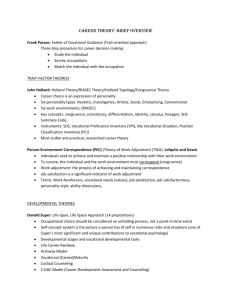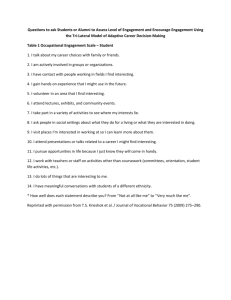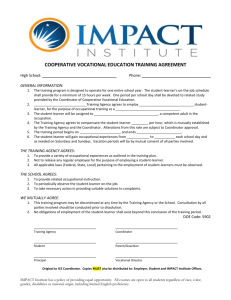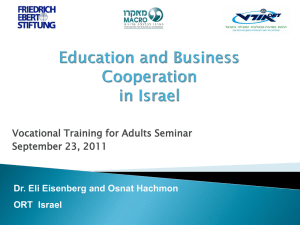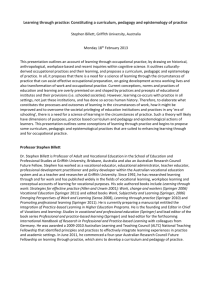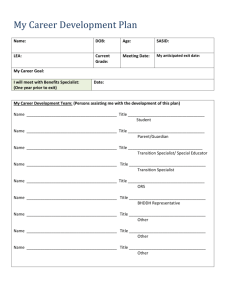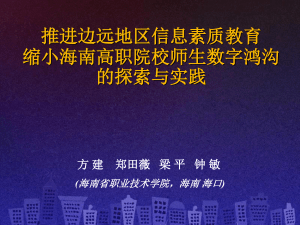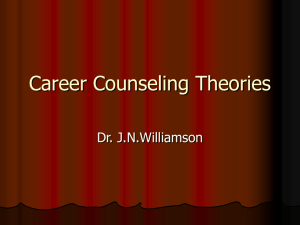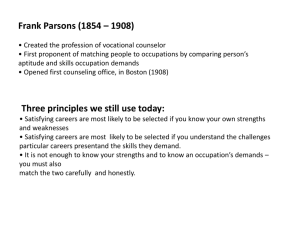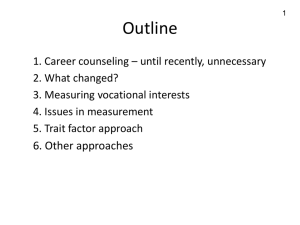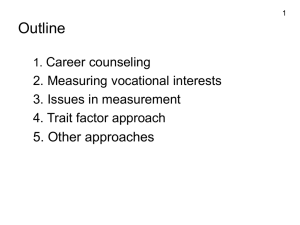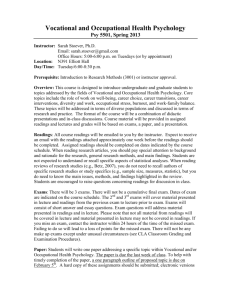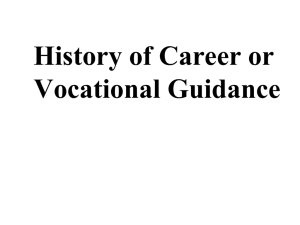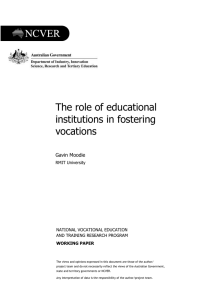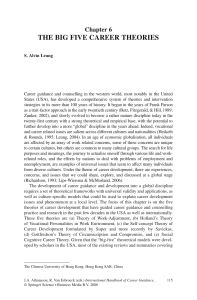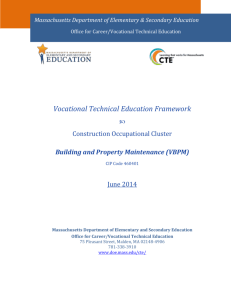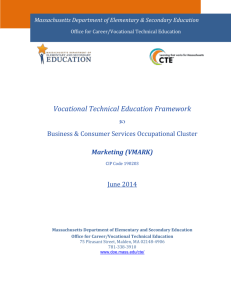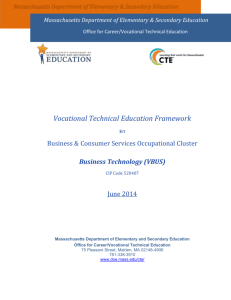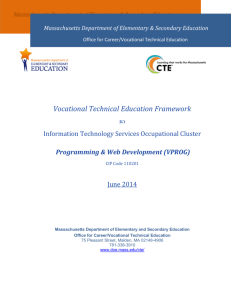Career Theory: Brief Overview Frank Parson: Father of Vocational
advertisement
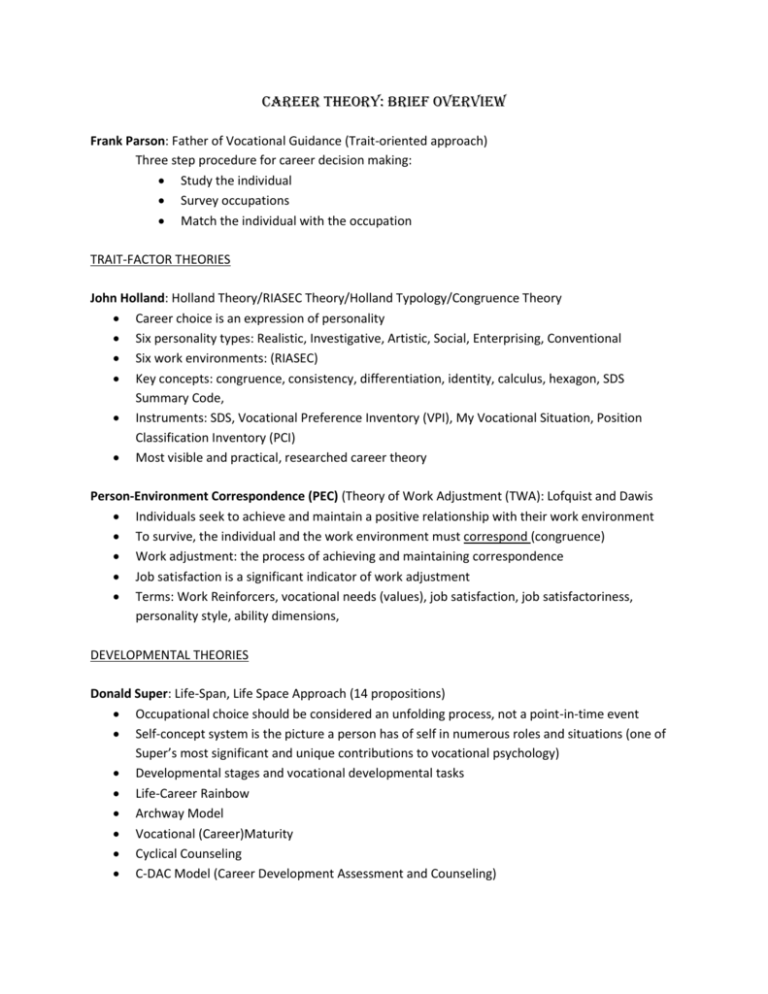
Career Theory: Brief Overview Frank Parson: Father of Vocational Guidance (Trait-oriented approach) Three step procedure for career decision making: Study the individual Survey occupations Match the individual with the occupation TRAIT-FACTOR THEORIES John Holland: Holland Theory/RIASEC Theory/Holland Typology/Congruence Theory Career choice is an expression of personality Six personality types: Realistic, Investigative, Artistic, Social, Enterprising, Conventional Six work environments: (RIASEC) Key concepts: congruence, consistency, differentiation, identity, calculus, hexagon, SDS Summary Code, Instruments: SDS, Vocational Preference Inventory (VPI), My Vocational Situation, Position Classification Inventory (PCI) Most visible and practical, researched career theory Person-Environment Correspondence (PEC) (Theory of Work Adjustment (TWA): Lofquist and Dawis Individuals seek to achieve and maintain a positive relationship with their work environment To survive, the individual and the work environment must correspond (congruence) Work adjustment: the process of achieving and maintaining correspondence Job satisfaction is a significant indicator of work adjustment Terms: Work Reinforcers, vocational needs (values), job satisfaction, job satisfactoriness, personality style, ability dimensions, DEVELOPMENTAL THEORIES Donald Super: Life-Span, Life Space Approach (14 propositions) Occupational choice should be considered an unfolding process, not a point-in-time event Self-concept system is the picture a person has of self in numerous roles and situations (one of Super’s most significant and unique contributions to vocational psychology) Developmental stages and vocational developmental tasks Life-Career Rainbow Archway Model Vocational (Career)Maturity Cyclical Counseling C-DAC Model (Career Development Assessment and Counseling) Developmental Theories continued… Ginzberg, Ginzburg, Axelrad, and Herma (Ginzberg Group) First to posit a theory of occupational choice from a developmental approach Stressed the importance of early choices in the career decision making process Occupational choice is a lifelong process that often requires re-assessment Three stages of occupational choice (fantasy, tentative, realistic) Useful approach for elementary school counselors (role of play and fantasy) David Tiedeman and R.P. O’hara Stresses the importance of ego identity andself-development A decision making paradigm that parallels Erickson’s psycho-social stages Theory of Circumscription: Linda Gottfredson Model of Occupational Aspirations People want jobs that fit their own self-image Key determinants of self-image: social class, level of intelligence, sex-typing People construct their own cognitive maps that are compatible with their self-image Terms: Stages of Circumspection, compromise, social space, cognitive map (zone of acceptable alternatives) SOCIAL LEARNING & COGNITIVE THEORIES Learning Theory of Career Counseling (LTCC): John Krumboltz Four factors: genetic endowments and special abilities, environmental conditions and events, learning experiences, task approach skills Emphasis on learning experiences throughout the life span Career counselors are professionals who promote client learning Happenstance Approach: Planned Happenstance is an amendment to LTCC o Unplanned events are opportunities for learning o Open-mindedness displaces indecision Positive Uncertainty : HB Gelatt o A creative decision making approach Career Information Processing Perspective: Peterson, Sampson and Reardon Based on models of Cognitive-Behavioral Theory/Models Major strategy is to provide learning events that develop an individual’s processing abilities Career problem solving is a cognitive process that can be improved through a sequential procedure known as CASVE (CASVE Cycle): Communication, analysis, synthesis, valuing, execution Pyramid of Information Processing Social Cognitive Career Theory (SCCT): Lent, Brown and Hackett Derived from Bandura’s General Social Cognitive Theory SCCT subscribes to Bandura’s model of causality (Triadic reciprocal) Three central variables: self-efficacy, outcome expectations, personal goals Additional key terms: personal agency and career beliefs PERSON IN ENVIRONMENT PERSPECTIVE (Contextual or constructivist approach) Narrative Approach: Mark Savickas o Contextual interactions over the life span Contextual explanation of career: (constructivism: people construct their own reality OTHER THEORIES Ann Roe: A Needs Approach Early relations within the family and their subsequent effects are the key to understanding career direction Person-oriented or nonperson oriented Value-Based, Holistic Model of Career and Life-Role Choices and Satisfaction: Duane Brown Values are the fundamental building block of personality and considered most important in the career decision making process Sociological Perspective on Work and Career Development Emphasize the interrelationship of psychological, sociological, and economic factors Status attainment theory, sociology of labor markets, race and gender, school processes, family effects, work commitment/environment ADDITIONAL NAMES Sunny Hansen: “Integrated Life Planning” David Blustein: “The Psychology of Working” In this original and major new work, David Blustein places working at the same level of attention for social and behavioral scientists and psychotherapists as other major life concerns, such as intimate relationships, physical and mental health, and socio-economic inequities. John Crites: Developed a comprehensive model of career counseling
